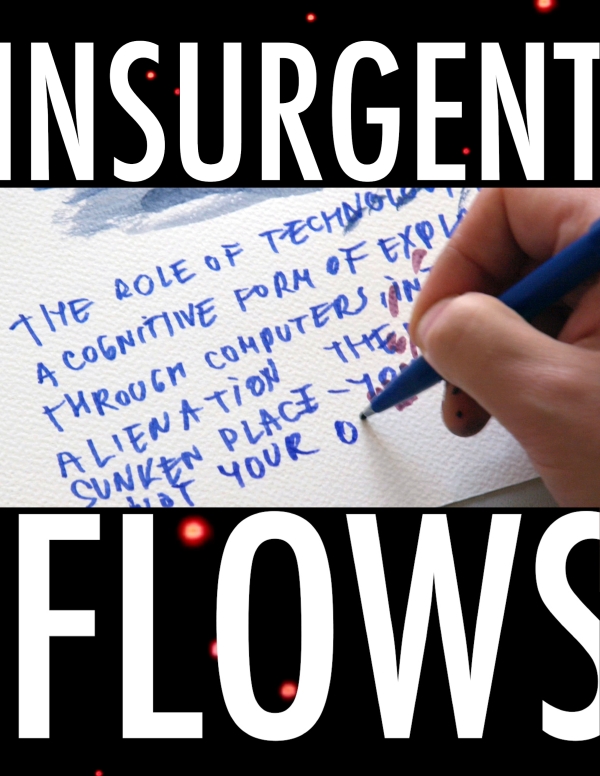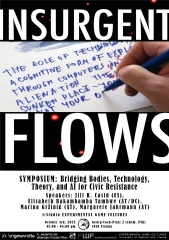A cooperation of EXPERIMENTAL
GAME Cultures/ University of Applied Arts Vienna and Academy for Fine Arts Vienna, Studio for Post-conceptual Art Practices/IBK.In an increasingly digital and interconnected world, the intersection of bodies, technology, theory, and artificial
intelligence (AI) presents an engaging and thought-provoking topic for a performative conference. This conference aims to
explore the connections between these domains and delve into their transformative potential for contemporary societies. Additionally,
it seeks to examine the power of civic resistance and the embodied fugitive intelligence of those made marginalized and outcast
bodies, embracing how their resistance can align with new technologies and AI algorithms.
This
conference will bring together researchers, activists, artists to explore the convergence of bodies, technology, theory, and
AI in the context of civic resistance. It will delve into the ways in which marginalized bodies, historically framed as disposable
and outcast, have employed embodied fugitive resistance as a means to survive and effect change. This means that the relationship
between body and gender through technology and super-digitalized machines can also be a thought-provoking area of discussion.
(Grzinic and Jahrmann)
This symposium is part of the LUDIC METHOD lecture series/book project. It is an emanation
of the research projects
Neuromatic Game Art: Critical Play with Neurointerfaces (FWF/PEEK) AR581 and
Conviviality
as Potentiality (2021-2025), funded by Austrian Science Fund FWF: AR 679.
Speakers & Topics:
Opening words by Univ.-Prof. Mag. phil. Eva Maria Stadler, head of Institute of Arts and Society at the Angewandte.Jill H. Casid (US) - Trembling the NecroceneCasid explores melancholy as an urgent praxis for
negotiating abandonment in the Necrocene. Casid discusses the potential of antiphonic performance as a technology to convoke
collectivities beyond identarian bounds and across earth, humanimal, and plant bodies.
Elisabeth Bakambamba
Tambwe (AT/DC) - The Body Beyond All BoundariesAs one of the most influential performers in contemporary art,
Tambwe takes the body beyond all boundaries, exploring identity, gender, and cultural heritage in her artistic practice. Her
work focuses on the body as a site of expression, storytelling, and political resistance.
Marina Gržinić
(AT) - Convivial Drama in the Heart of NecropoliticsGrzinic explores cinematic performative expressions that
challenge necropolitics. It proposes filmmaking that creates spaces of resistance, critique, and alternative narratives against
the framework of necropolitics.
Margarete Jahrmann (AT) - LUDIC Bridging: Role Play, Roles & Gender
SwitchingJahrmann examines the creative potential of AI in the context of games and the possibilities of AI
as a tool for artistic expression, storytelling, player activity, political activism, and role and gender.
Elisabeth Bakambamba Tambwe (DIG UP Productions association) has lived and worked in Vienna since 2005.
She was born in Kinshasa (Democratic Republic of Congo) and grew up in France, where she studied art. The reflection of her
art is based on organic architecture and her choreographic work is essentially oriented towards the sensitive, respectively
fragile dimension of the body. The focus of her work is the ongoing critique of the concept of normality, which she perceives
as tyrannical and degrading. Her productions have already been presented at the Wiener Festwochen, Impulstanz Wien, Tanzquartier
Wien, WUK, Steirischer Herbst or the Donaufestival Krems. As a performer, she collaborated with Robyn Orlin for various film
projects and choreographic processes. She has worked with Serge-Aymé Coulibaly, Faustin Lyniékula, Oleg Soulimenko, Claudia
Bosse and Monika Gintersdorfer, among others.
http://www.elitambwe.com/de/ An artist-theorist and historian,
Jill H. Casid holds the position of Professor of Visual Studies
with a cross-appointment in the Departments of Art History and Gender and Women’s Studies at the University of Wisconsin-Madison.
Casid pursues a research practice across writing, photography, and film that is dedicated to queer, crip, trans*feminist,
and decolonial interventions. Casid exhibits their artwork nationally and internationally, including in recent exhibitions
at Signs and Symbols and the Ford Foundation Gallery in New York and Documenta fifteen. Casid’s current projects concern the
question of doing things with being undone in the Necrocene and what aesthetics can do in confronting the political problem
of form in the situation of crisis ordinary.
http://jillhcasid.net/about Prof. Dr.
Marina Gržinić is a full professor at the Academy of Fine Arts Vienna, head of the
Studio for Post-Conceptual Art Practices (PCAP, IBK). She is principal investigator of the art-based research project “Conviviality
as Potentiality” (FWF AR679, 2021–25) and the Citizen Science project “Citizens’ Memories and Imaginaries” (FWF TCS 119, 2022–23).
She holds a PhD in philosophy and is an artist with a career spanning over forty years. She was the principal investigator
of the research project “Genealogy of Amnesia” (FWF AR439, 2018–21). Her areas of specialization include contemporary philosophy,
contemporary art, the study of coloniality and decoloniality, transfeminism, the analysis of racism, antisemitism, nationalism,
and the study of memory and history in relation to resistance. She co-edited with J. Pristovšek and S. Uitz the volume Opposing
Colonialism, Antisemitism, and Turbo-Nationalism: Rethinking the Past for New Conviviality (Cambridge Scholars Publishing,
2020). She is co-curator of the international group exhibition “Stories of Traumatic Pasts: Counter-Archives for Future Memories”
(with S. Uitz and C. Jauernik, Weltmuseum Wien, 2020–21).
https://convivialityaspotentiality.akbild.ac.at/ Prof. Dr.
Margarete Jahrmann, is head of Experimental Game Cultures at the University of Applied
Arts Vienna. She is principal investigator of the art-based research project NEUROMATIC GAME ART (FWF/PEEK AR581, 2021–23)
at the University of Applied Arts Vienna and the PSYCHOLUDIC APPROACH (FWF/PEEK AR787, 2023–25). Jahrmann is an internationally
renowned artist and pioneer of game art. She co-founded the Ludic Society 2006 ad part of her artistic PhD. She was professor
for the artistic PhD program at the Universits of Appled arts VIENNA 2019- 2021. She also was professor for Game Design at
the Zurich University of the Arts 2006 – 2021 and before this co-head of the digital arts department at the Zurich University
of the Arts from 2000 on. In her collaborative and interdisciplinary artistic practice, she explores ludic art and activism.
She creates hybrid performative and installative works dealing with game cultures, neuroscientific research and, emerging
technologies — with the aim to introduce game changer games. Her work can be found in the Computerspielemuseum Berlin, ZKM
Karlsruhe, Ars Electronica and her exemplary art- game-art work will launch the new digital collection of TMW, technical museum
Vienna in 2023.
http://www.margaretejahrmann.net, research:
https://neuromatic.uni-ak.ac.at












